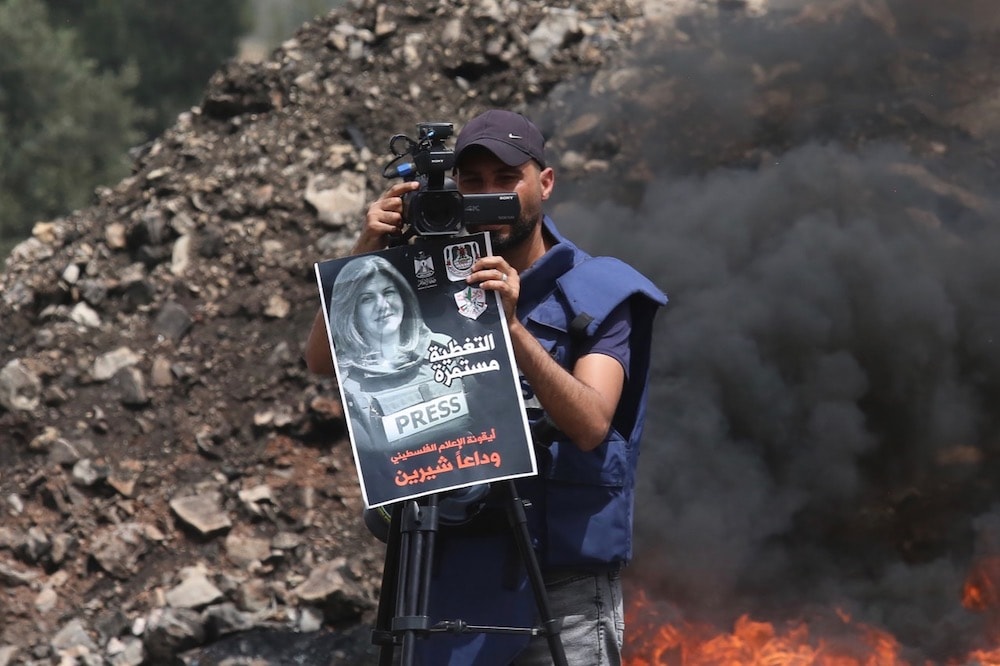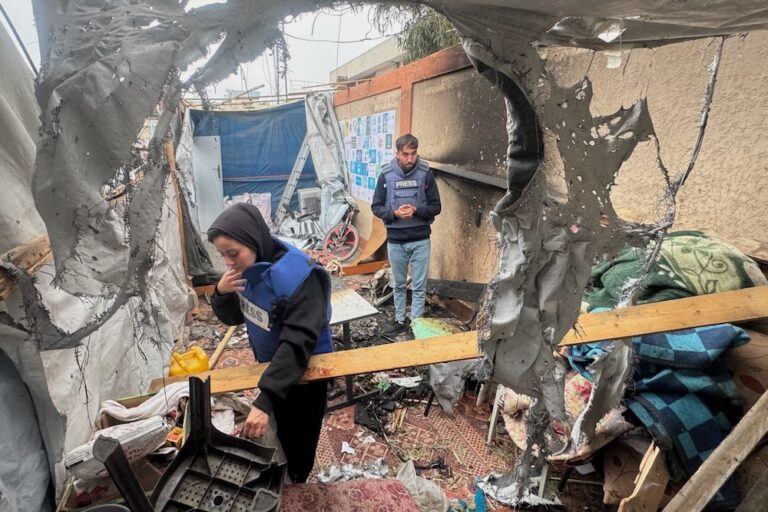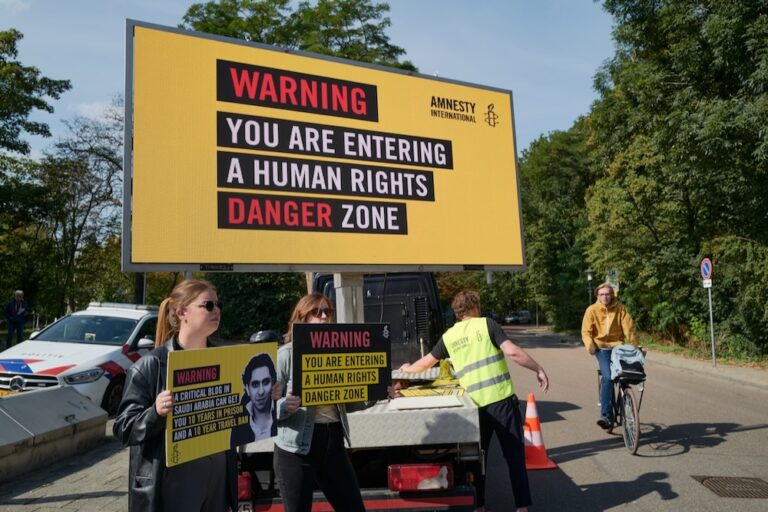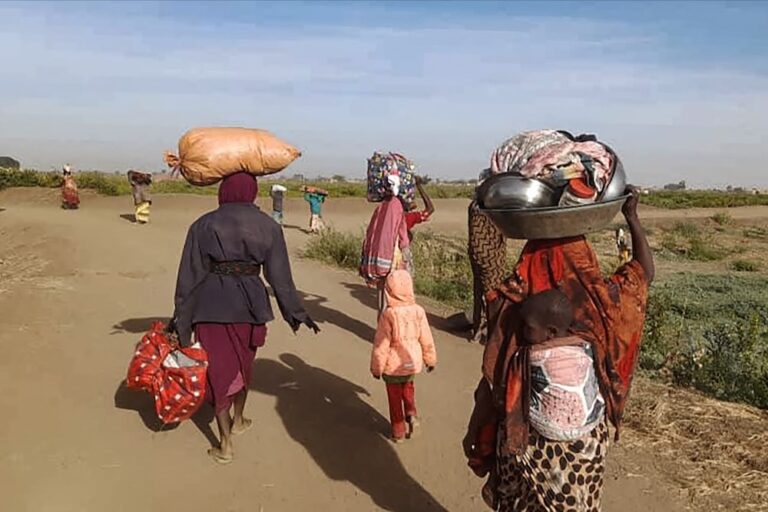May 2022 in Middle East and North Africa: A free expression roundup produced by IFEX's Regional Editor Naseem Tarawnah, based on IFEX member reports and news from the region.
Holding Israel accountable for ‘blatant murder’ of journalist Shireen Abu Akleh. Stifling critical voices in Tunisia and Algeria. Egypt’s revolving door of political prisoners. Internet shutdowns amidst protest clampdown in Iran.
‘In Cold Blood’: Killing the voice of a generation
Last month’s horrific killing of Al Jazeera journalist Shireen Abu Akleh by Israeli forces sparked international outrage and immediate calls for an investigation. Holding Israel responsible, Al Jazeera said Abu Akleh was “assassinated in cold blood” while covering Israeli military raids of a refugee camp in Jenin, and pledged to pursue legal prosecution of the perpetrators.
The targeting of the veteran journalist, as well as producer Ali Al-Samudi, also injured in the attack, underscores the wider pattern of violence journalists and media workers in Palestine face, and Israel’s culture of impunity, which civil society groups have repeatedly called attention to.
“The impunity of the perpetrators of all these Israeli crimes and violations against journalists and the media in Palestine… encourages the occupation to commit more of them,” said the Palestinian Center for Development and Media Freedom (MADA).
IFEX joined 34 rights groups in calling for an immediate and independent investigation. In a joint statement, the rights groups said the killing of the veteran journalist “represents a particularly egregious attack on the press, not least because of credible reports that Abu Akleh and other journalists were intentionally targeted by Israeli forces, but also in light of growing concerns over impunity for crimes against journalists and other grave human rights abuses by Israel in the occupied Palestine territory.”
With the Israeli military announcing it will not launch a criminal investigation into the journalist’s killing, Israeli impunity took center-stage last month as its forces attacked mourners carrying Abu Akleh’s casket ahead of her funeral, spurring calls from the UN High Commissioner for Human Rights Michelle Bachelet for an end to “this culture of impunity.”
Palestinian journalists and media workers also faced attacks by Israeli forces while covering last month’s “flag marches” led by Israeli settlers in Occupied East Jerusalem, while 31-year old journalist Ghufran Warasneh was shot dead by Israeli forces on her first day at a new reporting job in Hebron.
The pursuit of justice in Abu Akleh’s killing will likely see efforts to hold Israel accountable on several legal fronts, including Al Jazeera’s plans to refer the case to the International Criminal Court. In the wake of her death, journalist colleagues and writers have been remembering her life and legacy, especially her influence on a generation of women journalists.
“She was killed in Jenin and buried in Jerusalem. Every Palestinian village mourned her,” Palestinian journalist and eyewitness Shatha Hanaysha told the Committee to Protect Journalists (CPJ). “I heard a person saying that he “grew up with Shireen.” We all did. We all lived with Shireen because she was in all of our houses since she joined Al-Jazeera in 1997. She left a mark in our hearts, in all Palestinian hearts.”
Stifling dissent in Tunisia and Algeria
In Tunisia, President Kais Saied continues to entrench his one-man rule with planned constitutional changes in June while critical voices continue to be increasingly targeted. Amidst Saied’s announcement last month about the establishment of a “national dialogue” and holding a constitutional referendum, blogger and civil society activist Amina Mansour was given a six-month prison sentence for satirical comments she posted on Facebook criticizing the President and his associates.
Tunisian journalists protested the escalating repression and intimidation against the press in a demonstration organized by the National Syndicate of Tunisian Journalists. The country ranked 94th in Reporters Without Borders’ (RSF) latest World Press Freedom Index, falling 21 places since 2021. According to the organization, the intimidation of journalists has become normalized.
Journalists reporting on the country’s political crisis have faced “harassment, military trials, smear campaigns on social media, and sometimes official incitement by the president himself,” found a new report examining violations against journalists and media institutions in Tunisia under the exceptional measures issued by President Saied last year.
In Algeria, rights groups launched an online campaign last month drawing attention to how authorities have attempted to stifle dissenting voices and independent civil society. “Arrests and sentencing of peaceful activists, independent trade unionists, journalists and human rights defenders have continued unabated, even after the protest movement was shut down,” said the groups. Hundreds have reportedly been detained in recent months for their involvement in the popular Hirak protests, as well as those defending them, such as human rights lawyer Abderraouf Arslane.
“For the last two or three years, there have been thousands of legal cases against activists,” prominent lawyer Mustapha Bouchachi told the Associated Press. “Their only error is that they expressed their political opinions on social media… and are fighting for a state of law.”
Egypt’s revolving door of political prisoners
Egypt’s prison system continues to be a revolving door of prisoners of conscience. While several prominent political prisoners were released last month, including journalist Khaled Ghoneim and activist Abdelrahman Tarek (Mokka), three prominent public opposition figures received lengthy jail terms as authorities continued to clamp down on political opponents and critics.
Former presidential candidate Abdel Moneim Aboul Fotouh was sentenced to 15 years in prison. Aboul Fatouh’s deputy, Mohamed al-Qassas, and Moez al-Sharqawi, the former vice-president of the Tanta University Student Union, were both sentenced to 10 years’ imprisonment.
In a joint statement, several rights groups in Egypt, including IFEX members in the country, said that the verdicts: “make a mockery of the National Human Rights Strategy released by the Egyptian government in September and demonstrate the hollowness of its announced lifting of the state of emergency, so long as other repressive laws continue to be used to wrongfully imprison.”
Independent Egyptian rights groups stressed the need for authorities to avoid past mistakes in dealing with the detention of thousands of political prisoners, and establish a fair and transparent mechanism for their release.
“New numbers of detainees held on political charges continued to be added, far exceeding the number of those released, thereby maintaining and exacerbating the crisis of political prisoners without a solution for years,” said the human rights organizations.
Imprisoned activist Alaa Abd El-Fattah remains on an extended hunger strike while advocacy for his case has gradually gained an international spotlight. The recent granting of a British citizenship for the free speech activist has placed new pressure on the UK government to intervene and save his life.
The IFEX network joined rights groups in calling on UK Secretary of State, Elizabeth Truss, to immediately intervene on the behalf of the British-Egyptian citizen and secure his release and safe transfer to the UK. The mounting pressure may be working, as Abd El-Fattah was suddenly transferred last month to a prison with better medical facilities to address his deteriorating health.
In Brief
Qatar: A court sentenced brothers and lawyers Hazza and Rashed bin Ali Abu Shurayda al-Marri to ‘shocking’ life sentences on charges that included “contesting and refusing laws and decisions ratified by the Emir.” They were among dozens of Qataris detained last year during unprecedented popular protests denouncing the ratification of an election law that critics say marginalizes thousands from political participation. The court also issued a life sentence in absentia for Qatari poet Mohammed al-Ajami for publishing a video critical of the law.
Iran: Several prominent activists were arrested on baseless accusations during labor union strikes and ongoing protests against rising prices, with security forces using ‘excessive and lethal force’ to disperse anti-government protesters in several provinces. According to ARTICLE 19, the economic protests have been met with tear gas, arbitrary detentions, as well as internet shutdowns and disruptions that suggest authorities made preparations in advance to stifle expression.
Iraq: A new report, “They Will Not Shoot Down Our Dream”, by the Gulf Centre for Human Rights (GCHR) examines the increasingly hostile environment for human rights defenders and activists following the country’s October 2019 demonstrations.
The report documents the voices of human rights defenders, journalists and activists who expressed an urgent need for international support to help promote human rights, press freedom and accountability in the country. The report also noted the rise of violence targeting women human rights defenders, with one human rights defender saying, “We live in terror, and we fear that killings are part of a wider campaign aiming to silence women defenders.”
Also Noteworthy
Syrian lawyers and activists Mazen Darwish and Anwar Al Bunni were among TIME magazine’s list of 100 most influential people of 2022, in recognition for their work bringing Syrian officials to justice. President of IFEX member the Syrian Centre for Media and Freedom of Expression (SCM), Darwish, along with Al Bunni, provided critical evidence and testimony against Syrian officials accused of war crimes, including the landmark case of Anwar Raslan who was sentenced to life imprisonment by a German court earlier this year.
Meanwhile, exiled Iranian actress Zar Amir Ebrahimi won the best actress award at the 75th Cannes Film Festival for her role as a journalist in the Iranian film ‘Holy Spider’. “I have come a long way to be on this stage tonight,” she told the audience in her acceptance speech. “It was not an easy story.”
Lastly, in an episode of ARTICLE 19’s ‘Silenced’ podcast, exiled activist and prominent writer Iyad el-Baghdadi speaks about the killing of his friend, Saudi journalist Jamal Khashoggi.



